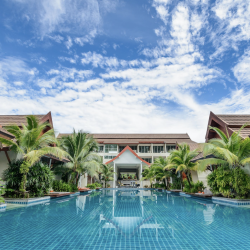When we think of the factors that make a hotel a safe and comfortable place to stay, our minds often jump to clean sheets, attentive staff, and excellent amenities. However, there’s one silent threat that may not immediately come to mind but is equally important: radon gas. Radon is a naturally occurring, invisible, and odorless radioactive gas that can seep into buildings, including hotels, and pose serious health risks. In this article, we will explore why hotels need radon specialists to ensure the safety of their guests and staff.
Understanding Radon Gas
Before delving into the importance of radon specialists for hotels, it’s essential to understand what radon gas is and why it’s a cause for concern. Radon is a radioactive gas that forms naturally from the decay of uranium in soil and rock. It can enter buildings through cracks in the foundation, gaps around pipes, and other openings. Radon is colorless, odorless, and tasteless, making it impossible to detect without specialized equipment.
The primary concern with radon is its potential health risks. Prolonged exposure to elevated levels of radon gas can significantly increase the risk of lung cancer. Radon is the second leading cause of lung cancer in the United States, responsible for an estimated 21,000 deaths each year. It’s a serious issue that affects not only homes but also commercial buildings, including hotels.
Why Hotels Need Radon Specialists
Guest Safety
The safety and well-being of hotel guests should always be a top priority. Hotels often welcome people from all over the world, and it’s essential to provide an environment that minimizes potential health risks. Radon gas, if left unchecked, can expose guests to elevated levels of radiation, increasing their risk of lung cancer over time.
Radon specialists are trained to conduct comprehensive radon testing in hotels. They can identify areas with high radon levels and recommend mitigation measures to ensure that guests are not exposed to harmful concentrations of the gas. With their expertise, hotels can take proactive steps to safeguard their guests’ health.
Staff Health and Welfare
Hotels rely on their staff to provide excellent service to guests. Just as guest safety is crucial, the well-being of the hotel’s employees should also be a concern. Radon gas does not discriminate; it can affect everyone inside the building. Staff members who spend a significant amount of time working within the hotel premises are at risk if elevated radon levels are present.
Radon specialists can assess the working areas in hotels and ensure that the staff is not exposed to dangerous radon levels. By prioritizing staff health and safety, hotels can create a more supportive and productive work environment.
Legal Compliance
In many regions, there are regulations and guidelines regarding radon gas in commercial buildings, including hotels. Failure to comply with these regulations can result in legal consequences, financial penalties, and damage to a hotel’s reputation. Radon specialists are well-versed in local radon regulations and can help hotels meet the necessary compliance standards.
By working with radon specialists, hotels can avoid legal issues and demonstrate their commitment to safety and compliance to both guests and authorities.
Reputation Management
A hotel’s reputation is a valuable asset. Word of mouth, online reviews, and customer satisfaction are vital to a hotel’s success. If guests or staff members become aware of radon issues within a hotel, it can quickly lead to negative reviews and a tarnished reputation.
By taking proactive steps to mitigate radon risks, hotels can demonstrate their commitment to guest safety and well-being. This not only safeguards the hotel’s reputation but can also attract health-conscious guests who prioritize safety when choosing accommodations.
Cost-Effective Mitigation
Hiring radon specialists can be a cost-effective investment in the long run. Identifying and mitigating radon issues early can save a hotel substantial expenses that might be incurred in the event of a radon-related health crisis or costly legal battles. Radon mitigation solutions are often more affordable when implemented as preventive measures rather than emergency responses.
Additionally, hotels that demonstrate their commitment to safety can potentially benefit from reduced insurance premiums, further offsetting the costs associated with radon mitigation.
Steps to Radon Mitigation in Hotels
Now that we’ve established why hotels need radon specialists, let’s explore the steps involved in radon mitigation within hotel premises:
Radon Testing: Radon specialists will conduct comprehensive radon testing in various areas of the hotel, including guest rooms, common areas, and employee spaces. This testing typically involves the use of specialized equipment to measure radon gas levels.
Data Analysis: Once the testing is complete, radon specialists will analyze the collected data to determine the extent of the radon issue. They will identify areas with elevated radon levels and assess the risk.Mitigation Planning: Based on the findings, radon specialists will create a mitigation plan tailored to the hotel’s specific needs. This plan may include sealing foundation cracks, installing ventilation systems, or other measures to reduce radon levels.
Mitigation Implementation: Radon mitigation measures will be implemented as per the plan. This may involve the installation of radon reduction systems or structural improvements to prevent radon entry.
Post-Mitigation Testing: After the mitigation measures are in place, follow-up testing is conducted to ensure that radon levels have been effectively reduced to safe levels.
Monitoring and Maintenance: Regular monitoring and maintenance are essential to ensure that radon levels remain low over time. Radon specialists can provide ongoing support to maintain a radon-safe environment.
Conclusion
Radon gas is a hidden danger that can affect hotels and their guests and staff. The importance of hiring radon specialists cannot be overstated. By prioritizing guest and staff safety, complying with regulations, and safeguarding their reputation, hotels can benefit from the expertise of radon specialists in identifying and mitigating radon-related risks. The investment in radon testing and mitigation is a proactive step that can save hotels from potential health crises, legal issues, and financial burdens. Ultimately, the safety and well-being of everyone within the hotel are of paramount importance, and radon specialists play a crucial role in ensuring that these needs are met.


